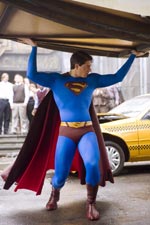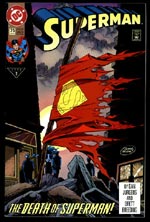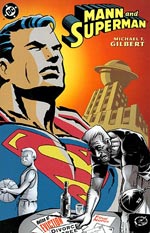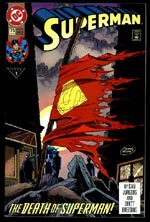“TThe world doesn’t need a savior. And neither do I.”

So states plucky reporter Lois Lane in the long-awaited Superman Returns, opening in theaters this week. Of course, the statement radiates irony the way Kryptonite gives off poison. In the comic book reality Lois inhabits, not only is she in constant need of a rescuer, but her world is as well.
Christians and even the most casual observers of pop culture have long recognized the similarities between this red-and-blue swaddled infant rocketed to earth and another babe wrapped in swaddling clothes and laid in a manger. Before we delve more deeply into the Christ-Superman connection, however, let’s review the history of an American icon.
Born in … Cleveland?
In 1933, the mad clown Hitler begins to enthrall the German masses with Nietzsche’s doctrine of the superman (ubermensch). Meanwhile, half a world away in Cleveland, two Jewish high school students, Jerome Siegel and Joe Shuster, have just created a superman of their own.
While no Nazi ubermensch, Superman’s ruthless pursuit of justice was terrifying. In the first comic to bear his name, Superman hurls a wife beater against the wall (“You’re not fighting a woman now!”) and pitches a wailing warmonger over a stand of trees. Mild-mannered this Superman was not!
Superman was the product of the Great Depression, an era draped with the shadow of war and acrid with the smell of the gangster’s Tommy gun. It was a day of strongmen with strong ideas about government—FDR, Franco, Mussolini. Desperate times called for desperate measures. Superman was the little guy backed into a corner, the stoop-shouldered victim who suddenly whipped off his round-rimmed glasses, ripped open his shirt, straightened up and took charge.

It’s this above-and-beyond-ness that still attracts us to Superman seventy years later. The superhero concept is more popular than ever—especially at the cineplex. Why? Must be this wonderful quality of being super. Despite our medical expertise and remarkable technologies, despite the fact that we live longer and healthier, we’re still nowhere near “super.” Our spirits soar, but our bodies fail. To paraphrase Chevy Chase’s old Saturday Night Live line, “I’m Superman—and you’re not.” It’s this simple, poignant knowledge that keeps us lining up at the box office to watch him fly.
Not that Superman flew in the beginning. Initially, he got around by means of eighth-of-a-mile leaps. Though knives broke on his chest, bursting shells could penetrate his skin. For 1938, this was plenty. But as time passed and competitors tried to muscle in on his territory, Superman had to become more super. Within a decade, he could withstand an atomic blast. By the 1960s, Superman could see across the universe and bathe in the sun. He had become a veritable god.
The aging of a superhero
Of course, a series about a hero incapable of failure is a quick recipe for boredom—thus the introduction of Kryptonite, to keep things interesting. Thanks to the alien element, a now vulnerable Superman gave his writers new ideas for plots and storylines. But even that creative well began to run dry.
As Superman entered his fourth decade of publishing, he faced his deadliest foe—time. Rust had appeared on the Man of Steel. Sales figures had fallen from the millions in the 1940s, to the hundreds of thousands in the late ’60s. Today, a Superman title rarely sells more than 100,000 copies.
Was Lois Lane right? Perhaps we didn’t need a savior after all.

And yet, Superman has enjoyed a resurrection of sorts in recent years—saved by the electronic media explosion. Kids may have abandoned his comics for Harry Potter, but, thanks to movies, cable TV, video games, and the Internet, the mighty S-shield is more visible today than ever. Smallville is flying high in the TV ratings. And Superman Returns is expected to be a huge box-office success.
Superman doesn’t seem to be going anywhere but up, up, and away.
Death and resurrection
The Christ-parallels were fairly obvious from the start: a father in the heavens sends his only son to earth to battle evil with powers and abilities far beyond those of mortal men. Some have noted that the Kryptonian surname “El” is also the Hebrew name for God. I doubt, however, that Siegel and Shuster had this in mind when they created the character; originally, the alien scientist was called Jor-L and his son Kal-L. Still, the rural foster-parents do tend to bring Joseph and Mary to mind. At this point, however, the analogies peter out—in the comics at least.
What the funnybooks whispered, the 1978 film proclaimed. Interestingly, Mario Puzo’s original story did not include the Christological line from Superman’s father, “For this reason above all others, their capacity for good, I have sent them you, my only son.” Someone else apparently added not only that line, but a speech that seems almost to have been lifted from the Gospel of John: “You will carry me inside you all the days of your life; see my life through your eyes, as yours will be seen through mine. The son becomes the father and the father the son.”
There’s another passage in the Gospel of John that resonates with the ’78 film: The raising of Lazarus. Who can forget Lois Lane’s awful, claustrophobic death, entombed in her own car, near the end of the movie, with Superman too late to save her? Desperate with grief, Superman circles the earth at incredible speed, somehow reversing the planet’s rotation and turning back the clock, raising Lois from the dead. One can’t help but compare the incident to the resurrection of Aslan in The Lion, The Witch and The Wardrobe, after which the great lion makes his speech about death itself working backwards. By making time work backwards, Superman also manages to reverse death—at least for Lois.
But what of Superman himself? While death was always a possibility for the Man of Steel, he was never the one who died and rose again … not, that is, until 1992.

Originally suggested at a writers’ summit as a joke, the death of Superman ultimately made comic book history. In this multi-issue epic, Superman battled a hulking, mindless monster aptly dubbed Doomsday. When it was over, the Man of Steel and his foe lay dead. The effect was galvanic. Thanks to DC Comics’ savvy use of the media, many who’d never bought a comic book lined up outside comics shops across the country to buy Superman #75—which sold an astonishing six million copies. And then, silence reigned as DC ceased publication of its flagship title. Fans held their breath for months. Was this truly the end?
Hardly. Casting a long strand of science-fiction gobbledygook, the writers found a way for him to come back from the dead. Fans heaved a great sigh of relief. At last, the Christ analogy seemed complete.
Or was it?
A crude imitation
Resurrected or not, Superman remains at best a crude imitation of the Son of God. Jesus offers transformation from within. Superman can only alter circumstances. Jesus can say, “Follow me” and expect us to do so, but who’s going to jump out a window to follow his caped counterpart? As badly as we might want to, there’s no way to enter Superman’s story. Amazingly, the Son of God entered ours.
I’ve found but a single Superman story to approach the true gospel message. It’s in a 2000 graphic novel, Mann and Superman. The plot is simple: Small time crook Marty Mann heists a priceless gem with the power to grant a man’s fondest wish. Marty wishes to be Superman. One body-switch later, Superman finds he has become a loser with unpaid bills and a contemptuous son. He first struggles with his predicament, then decides to turn Marty’s life around from within his own body.

Meanwhile, with the Man of Steel’s muscles, Marty has the power and exaltation he’s always wanted—but remains a failure. Superman, however, has made Marty a man worthy of his son’s respect. The tale ends with a chastened Marty renouncing power in favor of a new life, a life made possible only by Superman’s efforts in Marty’s own weak flesh.
Sound familiar? It’s reminiscent of the apostle Paul’s Philippian poetry in the “emptying” of the God persona and the eternal Son’s assumption of ordinary manhood. The personal redemption that follows is as gospel a message as any tract.
Like Marty Mann, we who follow Christ experience new life—and more: Eternal life, sharing our Savior’s glory. There will come a morning when we wake to discover we really can leap tall buildings in a single bound, when the glasses are off and the glory is on us.
That glory is ultimately what Superman represents. It’s why we can hardly wait for his return to the big screen, and it’s why, as believers, we anticipate a much greater Return. For what a fictional savior can never give us, Jesus will bring when he comes again.
I can’t wait.
Gary Robinson is preaching minister with Conneautville Church of Christ in Conneautville, PA. He’s also a writer and probably Superman’s biggest fan in Crawford County, PA.
Superman Returns photos copyright Warner Bros. Smallville photo copyright The WB.
Copyright © 2006 Christianity Today. Click for reprint information.













